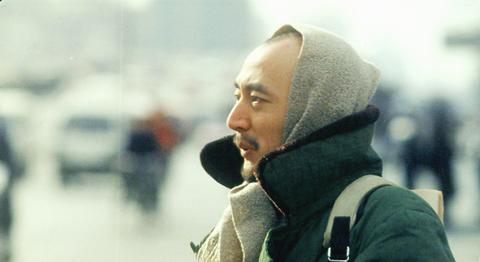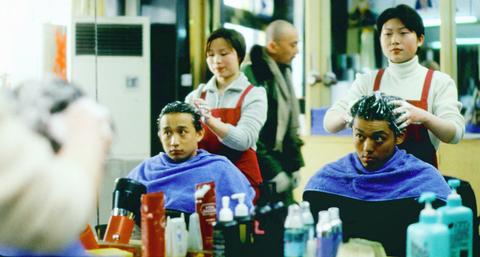Several images in the first five minutes of the film focus your attention on the cross-strait issue: two Taiwanese cameramen wearing A-bian hats shooting scenery on the Great Wall, with a Beijing youth as their assistant; a packet of Taiwanese Long Life cigarettes floating on the waters of the Southern China Sea.
And then there is the dialogue between a Taiwanese and a Chinese: Taiwanese: "Hey, should Taiwan be independent or be re-unified?
Beijing guy: "Independent, of course. Otherwise I would not feel the sense of going abroad after making such an effort to visit Taiwan."

PHOTO: COURTESY OF CMPC
Taiwanese: "No, the Straits should be unified, so when I come to Beijing to visit [next time], I will only have to catch a domestic flight."
This is a slow-paced, chilled-out, prose-like story about a Taiwanese youth's journey through the old streets in Beijing. Partly funded by KMT-owned Central Motion Picture Corporation (
Lin (played by Lim Giong), a cameraman on a TV crew shooting footage of the Great Wall, makes friends with a young man from Beijing, Chou (played by Huang Lei). He hires Chou as his assistant. In a series of misfortunes, Lin loses his job and then his Taiwan Compatriot Certificate (

PHOTO: COURTESY OF CMPC.
In his wanderings, he befriends Chou, a semi-unemployed worker -- his factory being on the verge of being shut down. Chou dreams of making a fortune by selling his grandfather's antique clocks or selling his prize pigeon Xue Zi, which he believes can fly to Xinjiang in China's far west. He wants to use the money to open an elementary school for his mother, so that everyone can listen to the talkative old lady.
Ger'er men (
"You can stay in my place 'cause we're buddies," Chou tells Lin. In the course of Lin's stay in Beijing, he meets lots of "buddies" in Beijing, undergoing a variety of experiences that Taiwanese who have visited China may easily relate to. Apart from the theft of his compatriot certificate, Chou has his jeep stolen, Lin is tricked when he tries to change money and gets pulled over by a policeman. These small events are used to focus on the cultural incongruities that exist between Taiwan and China.
Questions of identity, alienation and emotional burdens are gently probed in the film. For a Taiwanese to travel in China, the sense of strangeness amid familiarity gives rise to complex feelings, and Lin has plenty of time to explore different aspect of this feeling as he drifts through a cold, snow-covered Beijing.
In befriending Chou, Lin finds a companion much the same as himself -- unsuccessful and unsophisticated. They hang out, go to hot springs, have their hair cut and sing old Chinese folk songs together. Lin also engages in a couple of small affairs.
But can Lin make himself one with Beijing, or is he, after all, just a passer-by? This is a question the directors often project on to the narrative. Lin's experience is contrasted with that of Chuang, another Taiwanese living in Beijing.
Chuang met his wife while travelling to Xinjiang, and after marrying opened a cafe called Sculpting Time in Beijing, a place popular with Taiwanese overseas students. For him, home means his cafe, Taiwanese students and his wife. In contrast, for Lin, and for the directors Tai Tai-lung and Lien Chin-hua, the warmth and love he experiences in Beijing only emphasizes his alienation from his environment.
As Lin's Chinese girlfriend tells him: "You can come here and go home whenever you want to. But I can't." This sentiment is a reflection of Tai and Lien's own experience. Both directors spent time studying at the Beijing Film Institute and roaming the cities of China. "It is meant to be a cute movie in which feelings are genuine but lighthearted," Tai says.
But the ending of the story is confused, a reflection of the puzzle which is the cross-strait problem in the political realm. "I did not want to give [the film] a conclusion," says Tai. "For me, those feelings, and also the future of cross-strait are still full of uncertainty," he said.

June 9 to June 15 A photo of two men riding trendy high-wheel Penny-Farthing bicycles past a Qing Dynasty gate aptly captures the essence of Taipei in 1897 — a newly colonized city on the cusp of great change. The Japanese began making significant modifications to the cityscape in 1899, tearing down Qing-era structures, widening boulevards and installing Western-style infrastructure and buildings. The photographer, Minosuke Imamura, only spent a year in Taiwan as a cartographer for the governor-general’s office, but he left behind a treasure trove of 130 images showing life at the onset of Japanese rule, spanning July 1897 to

One of the most important gripes that Taiwanese have about the Democratic Progressive Party (DPP) is that it has failed to deliver concretely on higher wages, housing prices and other bread-and-butter issues. The parallel complaint is that the DPP cares only about glamor issues, such as removing markers of Chinese Nationalist Party (KMT) colonialism by renaming them, or what the KMT codes as “de-Sinification.” Once again, as a critical election looms, the DPP is presenting evidence for that charge. The KMT was quick to jump on the recent proposal of the Ministry of the Interior (MOI) to rename roads that symbolize

On the evening of June 1, Control Yuan Secretary-General Lee Chun-yi (李俊俋) apologized and resigned in disgrace. His crime was instructing his driver to use a Control Yuan vehicle to transport his dog to a pet grooming salon. The Control Yuan is the government branch that investigates, audits and impeaches government officials for, among other things, misuse of government funds, so his misuse of a government vehicle was highly inappropriate. If this story were told to anyone living in the golden era of swaggering gangsters, flashy nouveau riche businessmen, and corrupt “black gold” politics of the 1980s and 1990s, they would have laughed.

In an interview posted online by United Daily News (UDN) on May 26, current Chinese Nationalist Party (KMT) Chairman Eric Chu (朱立倫) was asked about Taichung Mayor Lu Shiow-yen (盧秀燕) replacing him as party chair. Though not yet officially running, by the customs of Taiwan politics, Lu has been signalling she is both running for party chair and to be the party’s 2028 presidential candidate. She told an international media outlet that she was considering a run. She also gave a speech in Keelung on national priorities and foreign affairs. For details, see the May 23 edition of this column,